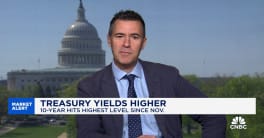Freddie Mac's Primary Mortgage Market Survey for the week ended February 16 reported mortgage interest rates at their highest levels of the New Year.
30-year fixed mortgage rates averaged 6.28 percent, an increase of 4 basis points since the previous week's report. The 15-year fixed rate product increased from 5.84 to 5.91 percent. Fees and points for both types of fixed rates dropped from 0.6 to 0.5.
The 5/1-year adjustable rates mortgage increased to 5.95 percent from 5.89
percent with fees and points down to 0.5 from 0.7 and the 1-year ARM also rose
slightly from 5.34 to 5.36 percent. Fees and points were up 0.2 to 0.7 since
the previous week.
The Mortgage Bankers Association's Weekly Mortgage Applications survey
for the week ending February 17 reported decrease in fixed rate products.
The 30-year fixed rate mortgage declined to 6.22 percent from 6.25 percent with fees, including the origination fee, decreasing from 1.23 from 1.34. The 15-year fixed rate also declined from 5.92 percent to 5.87 percent although those fees increased to 1.21 from 1.17. The 1-year ARM, however, increased from 5.52 percent to 5.60 with points decreasing slightly from 0.99 to 0.97. All MBA figures are for 80 percent loan to value mortgages.
Applications increased 0.8 percent on a seasonally adjusted basis from last week and 3.4 percent on an unadjusted basis but were to 80 percent of the volume the same week one year earlier. Refinancing activity dropped from 41.2 percent of total applications to 38.2 percent in a week.
It is worth noting that the differential between the 1-year ARM and the 30-year fixed rate mortgage in Freddie Mac's survey is only 92 basis points while the Mortgage Bankers survey had the different in interest rates at 62 basis points. The same week last year the differential in Freddie Mac's survey was 1.47 percent. The 5/1 ARM rate is 4 basis points higher than the rate for a 15-year fixed mortgage and only lags the 30 year by 33 basis points. Nonetheless, adjustable rate mortgages, while down from 29.6 percent of all mortgage activity to 29.1 percent is still holding on to a significant market share. Freddie Mac has theorized that many lenders are discounting the adjustable rate in order to keep that segment of the market alive - otherwise it is hard to explain why so many borrowers are willing to assume the risk of an ARM for such a small and probably temporary saving.







